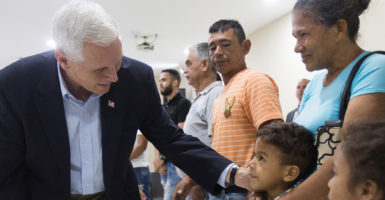Vice President Mike Pence, standing in for President Donald Trump at the Summit of the Americas, has long been highly engaged in Central American issues.
Pence departs Friday for the summit in Lima, Peru. Trump was initially going to attend, but, the White House announced Tuesday, the president opted to stay in the United States to monitor the situation in Syria.
Pence, who has been following matters in Central America since taking office, “looks forward to promoting policy that will lead to an even stronger U.S. economy and working with our close allies in Latin America to collectively hold undemocratic actors in the region accountable for their actions,” Pence deputy chief of staff Jarrod Agen said in a public statement.
On Thursday, Pence had lunch with congressional leaders at the White House regarding the Western Hemisphere in advance of his trip.
Pence is attending the conference at a time when the Trump administration is working with states to send National Guard troops to the southern border. The Trump administration is also renegotiating the North American Free Trade Agreement and confronting the dictatorship in Venezuela.
Pence has been one of the most outspoken critics in the administration of Venezuelan President Nicolás Maduro’s regime, and met with Venezuelan dissidents last August.
Dictator Maduro again deprives Venezuelans of free and fair elections. Snap elections are undemocratic, unconstitutional, and globally opposed. US will keep up pressure on regime to respect human rights of all Venezuelans, and restore country’s democracy: https://t.co/u8I2dIVcZB
— Vice President Mike Pence (@VP) January 24, 2018
After the trip, Pence will continue to be an administration point man with Latin America, traveling to Brazil in May to represent the United States at a meeting of the Organization of American States.
Last June, Pence was chairman of the Northern Triangle Conference on Prosperity and Security in Central America, where he met with the presidents of Argentina, Chile, Colombia, and Panama.
Pence has also been engaged with the Trump administration’s plans to renegotiate the North American Free Trade Agreement.
In November, the vice president met with U.S. auto executives about NAFTA. In December, he met with Republican governors.
Pence has largely been more pro-free trade than the president. Pence served on the House Foreign Affairs Committee, and was directly involved in trade issues for his state as governor of Indiana.
























